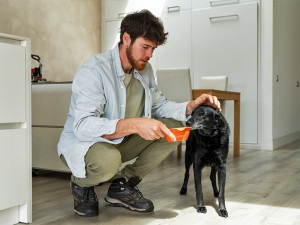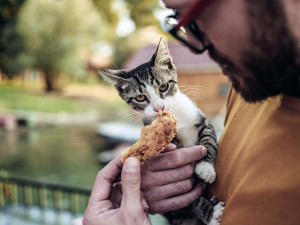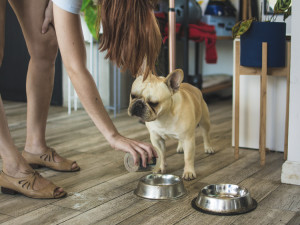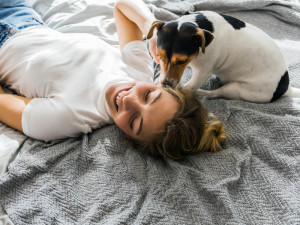Dog Treats Recalled for Potential Salmonella Contamination
Everything you need to know to keep your pup safe.
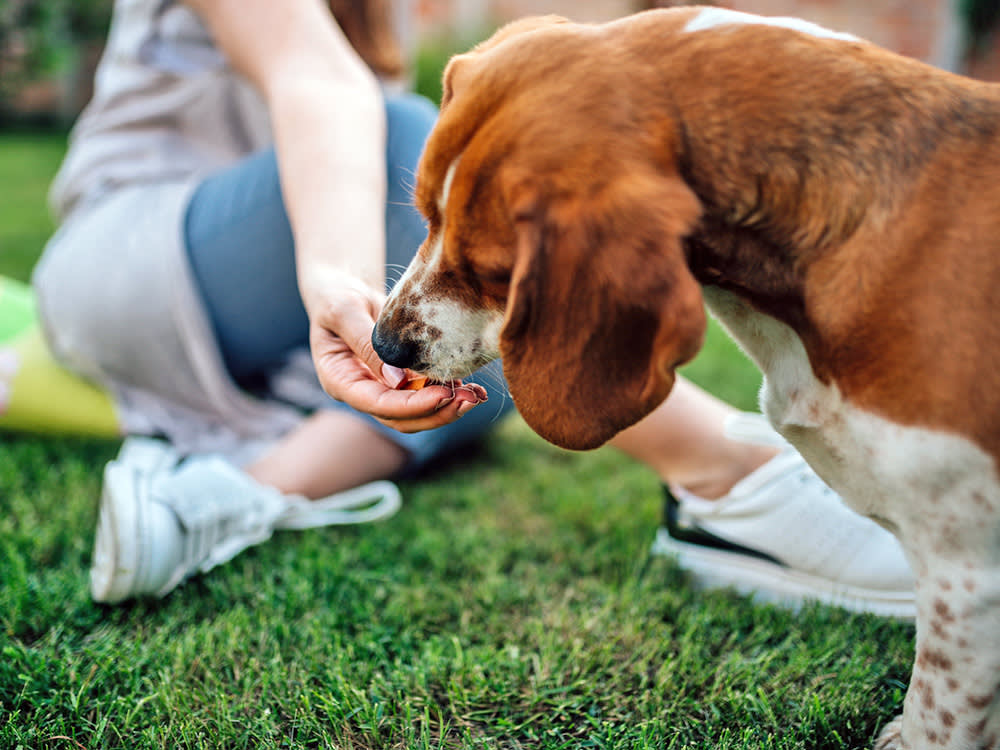
Share Article
On Friday, Gaines Pet Treats LLC announced a voluntary recall of their Gaines Family Farmstead Chicken Chips due to the possible presence of Salmonella. The recall was issued after “a third party tested and identified contamination in a related, unreleased lot of the same product,” the company explained in a releaseopens in new tab by the U.S. Food and Drug Administration (FDA).
Only one lot has been recalled: a five-ounce bag with an expiration date of Dec. 11, 2025, and the lot number 20061124 marked on the bag. So far, no illnesses have been reported.
In addition, Carolina Prime Pet, Inc., of Lenoir, North Carolina has initiated a recallopens in new tab of 400 16-ounce bags “Hollywood Feed Carolina Made Chicken Chips,opens in new tab” the FDA announcedopens in new tab on Nov. 23. These treats were also recalled because of potential Salmonella contamination.
Safety precautions
Any five-ounce bag of Gaines Family Farmstead Chicken Chips marked with the lot number 20061124 should be immediately disposed of in a manner that animals and people cannot access, the FDA recommends. Customers can contact Recall@GainesFamilyFarmstead.comopens in new tab for a refund or replacement.
The Carolina product comes in a 16-ounce purple-and-black bag marked on the back side with lot number 20051324L2 and an expiration date of Nov. 13, 2025. They were were distributed to Hollywood Feed stores in Alabama, Arkansas, Florida, Georgia, Illinois, Indiana, Kansas, Kentucky, Louisiana, Michigan, Mississippi, Missouri, North Carolina, Ohio, Oklahoma, Pennsylvania, South Carolina, Tennessee, and Texas, and were also available through online retailer www.hollywoodfeed.com. Those who may have purchased these treats may contact the company at treats@carolinaprimepet.comopens in new tab or 828-394-6460 Monday-Friday 8 a.m. to 4 p.m. EST for more information or for a refund or replacement.
According to the Centers for Disease Control and Preventionopens in new tab (CDC), because Salmonella can be spread on surfaces, any object that made contact with a potentially contaminated treat — such as a counter, cutting board, or utensil — should be washed with soap and water.
If you are worried your dog has been infected with Salmonella, it is recommended to wash your hands after any contact with your pup, minimize contact with their saliva, use gloves when picking up feces, and disinfect your dog’s belongings, explains the Swedish Veterinary Agency.opens in new tab
Symptoms of salmonella in dogs
Salmonella bacteria can cause a variety of symptoms in people and pets. Often, dog with Salmonella infections will be asymptomatic but can shed the bacteria in their saliva or waste. The most common symptoms of dogs with salmonella are diarrhea, loss of appetite, dehydration, lethargy, fever, and weight loss, Dr. Amy Fox told Kinship.
There are at-home treatments for many of the mild symptoms of salmonella in dogs, such as hydration, probiotics, and a bland diet for digestive upset. Dogs will often recover on their own. If your dog has a decreased appetite or diarrhea for longer than 12 hours, Dr. Fox recommends seeing a vet. If your dog shows symptoms like bloody diarrhea, not eating at all, severe lethargy, pain in their belly, or difficulty breathing, they should see a veterinary professional immediately.

Sio Hornbuckle
Sio Hornbuckle is the Assistant Editor at Kinship, where they frequently write for the site. As a writer, they specialize in pet news, animal science, and pop culture. They live in New York City with their cat, Toni Collette.
Related articles
Salmonella in Dogs: Can Dogs Get Salmonella?
What to look out for if they are sick from this bacteria.
Can Humans Get Dogs Sick?
Think of the amount of tissues you’d need...
![Man feeding small white and gray cat a chicken wing.]()
Can Cats Eat Raw Chicken?
Careful — cooked chicken is way safer for your kitty.
Can Dogs Eat Raw Chicken?
They’re definitely curious about what you’re chopping over there on the cutting board...
![A frenchie dog waiting for food as a woman bends down to pour food into a dog bowl.]()
You’re Probably Not Washing Your Dog’s Bowl Enough
And according to a new study, it’s putting their health at risk.
![A happy woman is lying on a bed, her dog smelling her face.]()
9 Diseases You Can (and Definitely Can’t) Catch From Your Dog
Here’s what you can scratch off your “Worry About This” list.
